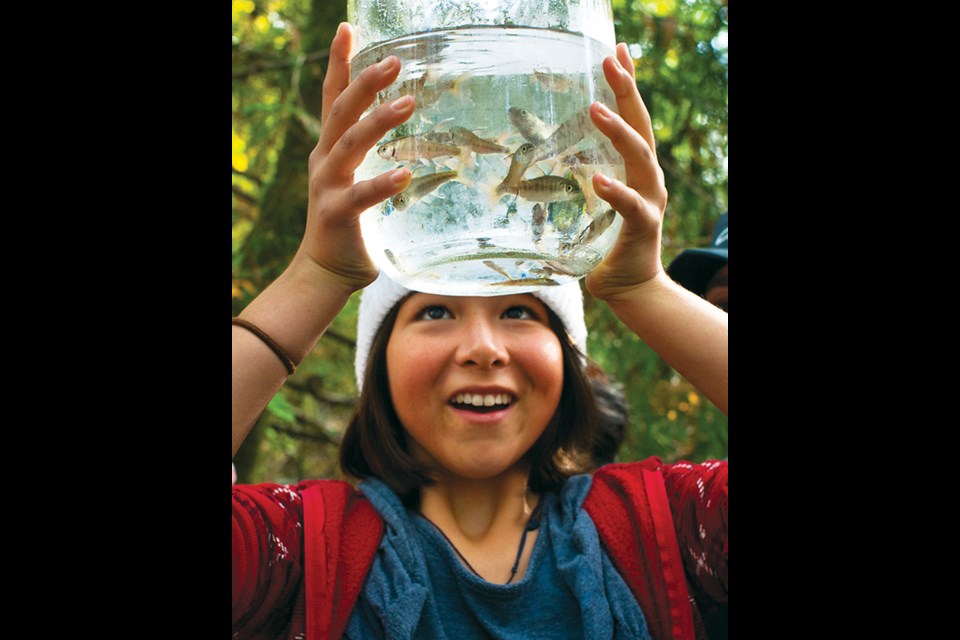Many studies support the positive impact of children playing outdoors, but with the temptation of technology and screens, the indoors and outdoors can, at times, compete for their attention.
But screens and nature don’t have to be separate, explains Alex McKimm, Saplings outdoor program lead in Squamish.
“I think there’s so much value to pairing indoor and outdoor education,” she says. “We have the benefit of being able to take a screen and research, say, what we’re listening to with what we’re seeing.”
Whether identifying leaves online or researching bird calls, information gained indoors can enrich the outdoors experience, she explains.
What indoor learning can’t provide, though, is the sensory explosion of the outdoors, which surrounds children with sights, sounds and smells they just can’t get elsewhere, she says.
Conor McMullan, director of education at Cheakamus Centre, agrees. “Learning outdoors is very tactile, kinesthetic, and sensory… in a way that engages a multi-intelligences approach.”
Although it may just look like play, exploring the outdoors also fosters skills in children that complement those learned indoors, says McKimm. Such skills include cooperation, critical thinking, problem solving and participation, as well as a strong sense of self, says Stephanie Vigneux, nature connection mentor and program facilitator at Foragers School of Nature.��
There’s also a strong social and emotional component to playing outdoors, made all the more impactful by playing in a group, explains McMullan.
McKimm agrees. “The magic is in the social dynamics,” she says, adding that connections happen so naturally outdoors through helping friends climb trees or building mud pies together.
This type of group learning can be both transformative and inspirational, and provides an opportunity to give meaning and understanding to self-expression and creative exploration.
“So much of what kids are taught now is follow the rules, stay in the lines…. I think that giving kids a completely blank slate is so valuable,” says McKimm. “They’re taking a completely open structure and figuring out how they are going to play with it. They’re making their own decisions and directing themselves.”
Parents, though, can get a bit distracted by the cold or the wet outdoors, or the fact that they’re really not getting very far, she notes. “But kids are like, ‘I don’t want to walk, I want to climb a tree and I want to pick up a rock and I want to look at the bug… so if you’re willing to just sit back and see where they want to go, there’s huge value in that.”
McMullan agrees. “Their idea of exploring the outdoors is not going from A to B… with a good heartrate built up. It’s going out and stopping and turning over the stones to find the bugs and millipedes.”
Such free play is incredibly important, he says; it’s something we should strive to do more often and there are opportunities to do so everywhere in Squamish.
“We’re blessed in this part of the world where you don’t have to go far to find green space, and if it’s grey or if it’s wet, that doesn’t mean you have to be inside,” he says, adding that you don’t have to trek to spectacular waterfalls to have an adventure.��
“Kids, especially young ones, are so naturally curious that they’re going to find oodles of things right in front of them. Whether it’s the back yard or the front of the apartment building, there’s lots to explore.”
And it’s never too early to start exploring, says McKimm.��
“Foundations set in early years are key to building a lifelong connection with environmental stewardship.”��
But it takes commitment from parents, she says, to share in that exploration and build their child’s confidence and independence in the environment around them.
To make an outdoor experience as engaging as possible, McMullen suggests packing pieces of equipment such as clear plastic cups for scooping up stream water, small nets and magnifying glasses.
��
Waterproof jackets and rainboots are also essential, adds McKimm, “because puddles are awesome and some of the best experiences come from splashing and being soaking wet.”



